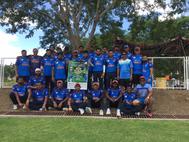News
Why is nobody talking about the T20 Physical Disability Cricket Series?
 PRE MATCH ANALYSIS
PRE MATCH ANALYSISA six-nation T20 Physical Disability Cricket World Series began on Monday.
Sports knows no disability. MLB pitcher Jim Abbott, who was born without a right hand, won a gold medal in the 1988 Summer Olympics. Swimmer Jessica Long’s amputated legs have not stopped her from holding world records in 13 Paralympic events. Norwegian skier Ragnhild Myklebust, who suffers from polio, holds the record for the most number of medals won at the Winter Paralympics. The list is endless and inspiring. There is no sport in the world that a specially-abled person cannot play.
But the question is – how many people watch the Paralympics on television? The differently abled not just fight their opponents, but their own disability as well, something that makes for an awe-inspiring watch. Yet, recognition has always dodged them. Even the world’s second most watched sport – cricket – suffers the same fate when it comes to cricket for the disabled.
There is cricket for the blind, deaf and also for the orthopedically handicapped. Since the media attention they receive is minimal, and most of the games are not televised, these talented cricketers and their achievements fade into oblivion. India’s blind cricket team have won four World Cups in six years, a feat not known to many. All of that without accreditation from the Indian cricket board, match fees and sponsorship.
T20 Physical Disability Cricket World Series 2019
A six-nation T20 Physical Disability Cricket World Series, featuring host England, India, Pakistan, Afghanistan, Bangladesh and Zimbabwe, began on 5th August 2019. All the teams comprise of orthopedically handicapped cricketers, who will be playing the same form we see in mainstream cricket. The Indian team is named Wadekar Warriors, in honour of late Ajit Wadekar, former India skipper and founder of All India Cricket Association for Physically Challenged, the body which selected the team.
India’s first game is on 6th August against England, but there will be no live telecast or online streaming. The beautiful art of bowling leg-spin without having fingers in both your hands, something that all-rounder Ramesh Naidu makes look effortless, will be deprived of viewership. Fans will be deprived of this bowling which transcends impossibilities into possibilities.
The skipper of the Indian team, Vikrant Keni’s right leg has been troubled by polio since birth. Right hand batsman Kunal Phanase’s left leg was crippled in his childhood due to an incorrect hip surgery. Wicket-keeper Tushar Paul and all-rounder Anshul lost their respective right legs in a bus and cycle accident respectively, while all-rounder Suganesh Mahendran lost his left hand in a bike accident. Southpaw Gopinath Sante’s right hand was incapacitated by a wrong injection.
All-rounder Jithendra Vaddi Nagaraju’s right hand was debilitated by a snake bite in his childhood, while a chaff cutter claimed left arm pacer Mandeep Singh’s right hand during his junior cricket days.
Amir Hasan Rather – the speedster to watch out for, does not have fingers in his right hand which were amputated after a severe burn. The others in the team are handicapped by birth.
But it is their love for the game, and their appetite to beat odds, that has brought them to a world cricket tournament.
More than half of the team belongs to farming backgrounds and is still hoping that someday the game will give them a job and a living. As of now, they have been funded by a Mumbai-based entrepreneur.
The Role of Indian Board and the Media
After India won the fifth edition of the ODI World Cup for the blind last year, each member of the team was awarded rupees two lakhs by the union government. When the mainstream Indian Cricket Team won the 2011 ODI World Cup, each player was awarded rupees one crore by the BCCI.
According to a report in the Financial Express, the BCCI confirmed its status as one of the richest sporting bodies in the world in 2012, when its annual report showed a revenue of Rs. 5,300 crore. In a commendable initiative, the wealthy board spent considerable money in helping the Afghanistan cricket team get operational facilities in India. But when it comes to their own boys, who play a slightly different exponent of the game, the board is unheeding. Charity begins at home, but not in the BCCI.
This can be viewed from another perspective too. Sport is revenue driven, at least in India. Funding without revenue from a business perspective is not pragmatic. Not many people may watch the lesser known forms of cricket if it is televised. This is where journalism comes into the picture. The media needs to extend its arm to these lesser known cricketers, cover their stirring stories, create headlines out of those and ensure that recognition goes where it is due. Once there is recognition, there will be interest. And once there is interest, there will be revenue, at least a minimal to begin with.
As the orthopedically handicapped begin their T20 sojourn today, it is the media’s responsibility to write on the spirited boys who will be representing India at the highest level. Our famous cricket stars, who can influence their wide fan base, should do some talking about the disability series on social media. Irrespective of whether the disabled cricketers win or lose the games, they have already won against their impairment, and that calls for some sports cover tales. Let them no longer be the stepchildren of cricket.
India’s complete schedule
August 6 – India vs England
August 7 – India vs Bangladesh
August 8 – India vs Afghanistan
August 9 – India vs Pakistan
The final will be played on August 13.